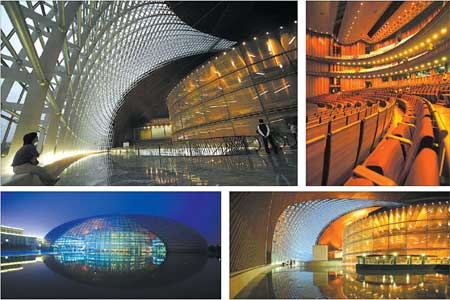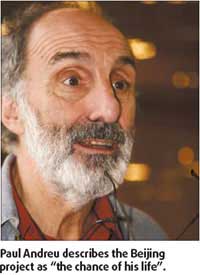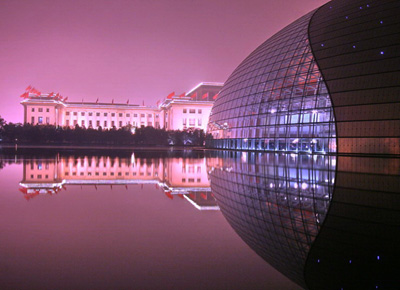It is the day after the soft opening of the National Grand Theater, the most ambitious modern project on China's cultural landscape, and a building that has rendered its designer Paul National Grand Theater National Grand Theater Andreu a servant to his own creative vision. After 10 years, the French architect is confident the venue will be adopted by the wider public and transcend controversy to be recognized for its rich, cultural legacy.
Designed by French architect Paul Andreu, the National Grand Theater is slated to become the country's top performance venue.
Slated to become the country's top performance venue, it comprises three theaters encased in titanium and glass, forming a huge sphere hovering above a man-made lake and surrounded by gardens.
Its distinctive, shimmering oval lies immediately to the west of the Great Hall of the People, located on Chang'an Avenue and running across Beijing's imperial axis from Tian'anmen Square to the Forbidden City.
"I had the feeling this was a very important place," the 69-year-old says in an interview with China Daily. "Because there was Tian'anmen Square and the Great Hall of the People, so there was history, power and now culture; the theater was about culture.
"Of course, it has to be respectful of the buildings but it has to be different. So, I really decided that I would propose something new, something creative."
The complex is sunk below ground level, with entry via a glazed underwater tunnel. Functionality and politics aside, Andreu's vision is one of romance.
"I thought, 'let's make a kind of island on the water, something like in the tales, in the legends, that you can't touch, but you can go under and be inside'," he says.
"It is a tale of people discovering paradise, discovery of a dream fiction - theater is that, opera is that."
The theater's 2,416-seat opera house staged its first test show on September 25 - nearly 10 years after the Chinese government selected Andreu from an international bidding process. An audience of construction workers and evicted residents watched the revolutionary ballet, The Red Detachment of Women. However, much more drama surrounded the capital's entertainment center in the lead-up to its opening.
Construction was postponed for 18 months, and technical and budget issues resolved, with costs cut by about 20 percent to 3 billion yuan ($395million).
In May 2004, a fresh storm of criticism rose with the collapse of the roof of a terminal at Paris' Roissy-Charles de Gaulle airport, also designed by Andreu.
Yet Andreu reveals an unshakeable faith in his concept.
"(Compromise) is something I tried never to do, because compromise means that which you regret because you have to be political and that is the end of art," he says.
"In any case, it would be modern. It could be modern without innovation or without any form, it could be gray modern, or it could be crazy modern. Or it could be what I think it is - a modern building that is a full creation without compromise of any kind.
"I am really confident that in 20 or 30 years, people seeing the opera will think, 'this is typical Chinese architecture'.
"It is rooted in China, constructed in China - not a piece of stone came from another country."
Only wood was imported for the theater's construction, as sufficient quantities of the specific kind could not be sourced domestically.
The renowned architect, who has designed airports around the world, described the Beijing project as "the chance of his life".
"Immediately, I thought about my responsibility. I thought, 'I am in charge of an important thing, I have to be at the level of this'. Always with my buildings - but with that one in particular - I am the servant of the building.
"The building was above me, because it is financed by the public, because it is open to be public and we have to serve that."
The opera house was envisaged, Andreu says, as a means to bring a new generation to high culture.
"It should be one place where the people should come, even if they don't go to a concert or the theater," he says.
"People normally don't dare to go to this sort of place, because they think these are reserved for people who know, people who have culture.
"But this was for everyone, also for the young people. The public of the future is young people, and you have to invite them to a space they will want to come, at the same time show them a place of dignity and culture that is not the disco - they can have both," he says.
Andreu also designed Shanghai Pudong Airport, completed in 1999, and the Guangzhou Gymnasium, finished in 2001. In 2001, he was made an honorary citizen of Guangzhou.
He says China is experiencing an exciting architectural period similar to that which Europe underwent at the turn of the 19th century. "It is such a moving and dynamic country you have so many fantastic opportunities to participate in something great."
The National Grand Theater will stage more than 20 performances during its current pilot program. It will be officially open at the end of this year.
(China Daily October 9, 2007)




